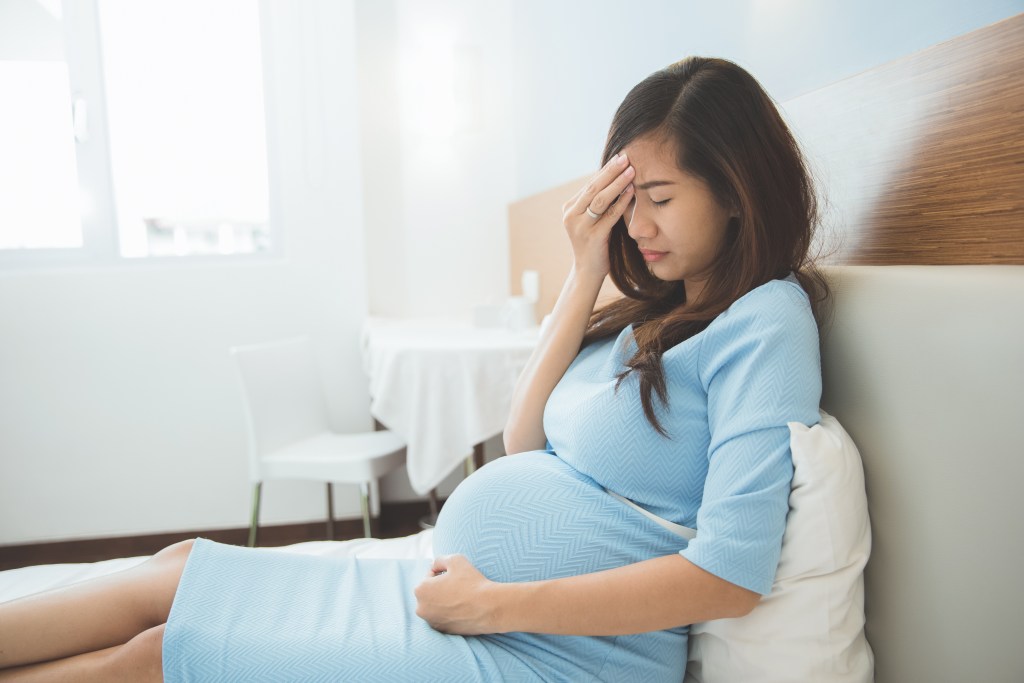In terms of medical appointments, the first trimester of pregnancy can be pretty uneventful. You may not even see your provider until you are 10 to 12 weeks along, at which point you’ll begin the rituals of peeing in a cup, getting measured and weighed, and hearing your baby’s heartbeat. However, there are reasons to get in touch with your doctor or midwife sooner. The discomforts of early pregnancy are many and varied, but there are a few first trimester problems you shouldn’t ignore.
Bleeding
Every pregnant person fears the sight of their own blood when they use the bathroom. The good news is that a lot of pregnancy bleeding doesn’t signify a problem. Spotting after a vaginal exam or sexual intercourse, for example, is usually nothing to worry about. An infection can also cause bleeding. The American College of Obstetricians and Gynecologists (ACOG) estimates that bleeding occurs in 15 to 25 percent of all pregnancies. The quantity and color of the blood are things to note when you call your provider. Blood can range in color from red to pink to brown. Spotting means drops of blood on your underwear or the toilet paper, while bleeding means you need to use a liner or pad to soak up the blood. Your provider will want to know how many pads you are going through.
Bleeding can be a sign of miscarriage. Unfortunately, miscarriage occurs in 10% of known pregnancies, and usually happens in the first trimester.

Cramping
Cramping in early pregnancy is also quite common. Chad Klauser, M.D., Clinical Assistant Professor of Obstetrics and Gynecology at the Mount Sinai School of Medicine in New York City, told Parents, “The majority of pregnancies will have some mild (light) cramping intermittently during the first 16 weeks.”
Some people experience mild cramping very early in pregnancy, around the time that the fertilized egg burrows into the uterine lining. This is known as implantation cramping, and is sometimes accompanied by light bleeding or spotting.
Cramping can be another sign of miscarriage, or, much less commonly, an ectopic pregnancy, (one that occurs outside the uterus, usually in the fallopian tube) so it’s important to let your provider know if you are having painful cramps.
Severe nausea and vomiting
Nausea and vomiting are a classic sign of early pregnancy, but if you are experiencing frequent nausea and vomiting, be sure to let your provider know. There are remedies and medicine that can help ease your discomfort. If you are vomiting so much that you become dehydrated, your provider may also want to treat you with IV fluids. If you are not urinating, urinating only a small amount of dark urine, or cannot keep fluids down, let your provider know right away. One thing you can do to prevent nausea and vomiting is to take a prenatal vitamin. The ACOG confirms that taking a prenatal vitamin before and during pregnancy reduces your risk of having severe nausea and vomiting.
High fever
If you are running a fever higher than 100.4 degrees Farenheit, you should contact your provider, as it could be a sign of infection.

Headaches
Mild headaches aren’t usually a cause for concern, but let your provider know if you are experiencing serious pain. Headaches can also be a sign of high blood pressure, so it’s important to tell your provider if you begin experiencing headaches at any point in your pregnancy.
Fainting or dizziness
Fainting is another classic sign of early pregnancy, and is often no cause for alarm. Do let your provider know, however, if you experience fainting or dizziness, as these could be signs of a problem.
Other unusual symptoms or changes
If you experience a symptom that would normally send you to the doctor, it’s probably something to let your provider know about when you’re pregnant, too. Pain, burning, trouble urinating, or unusual vaginal discharge could signify an infection, for example. Strange swelling, blurred vision, seeing spots, or pain in your arms, legs, or chest are also reasons to call your provider, according to the Cleveland Clinic.
If there’s one universal symptom of early pregnancy, it’s worry. Knowing that monumental changes are occurring without being able to actually see what’s going on is enough to make every little twinge feel consequential. Rest assured that if you have a concern, your provider has fielded the same inquiry from patients before you, and you shouldn’t waste any time feeling embarrassed about your questions.




